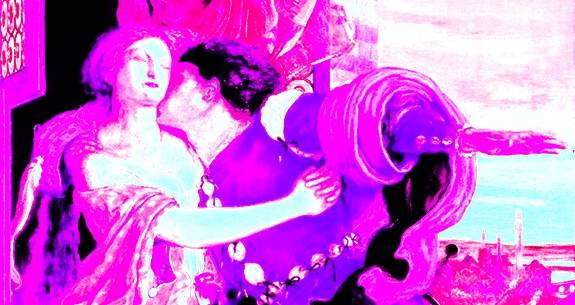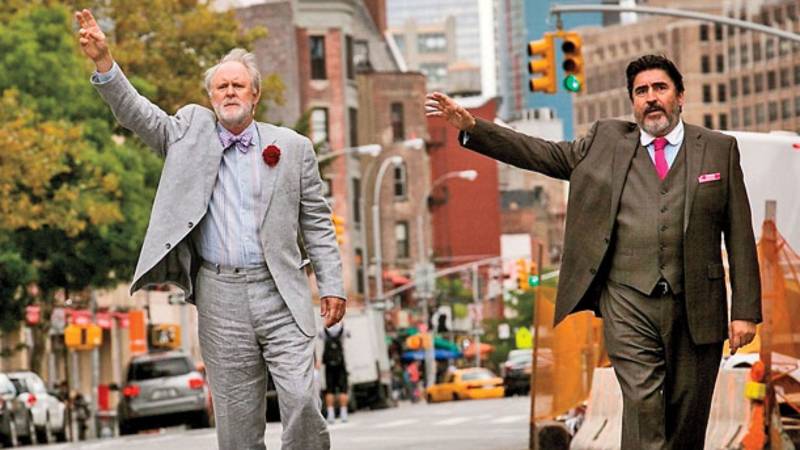
Love is strange. What makes for a good love story? Is it the circumstances in which two people fall in love? Is it the obstacles they face? Is it the lighting? The soundtrack?
There are brilliant romantic comedies and terrible ones. There are Jane Austen novels, the tragedies of William Shakespeare, and the witty exchanges of Oscar Wilde.
Beatrice & Benedick. Ross & Rachel. Jay-Z & Beyonce. Ellen & Portia.
A little ditty about Jack & Diane.
With Valentine’s Day knocking on the door and hearts all a-flutter, I turned once again to some trusty SP allies. I cast my lines with very little bait, asking only to know what the respondents consider their favorite love stories. Anything is fair game, I told them, including (but not limited to) books, movies, TV shows, and theatre.
Based on what I received, I can tell you this about those brave souls who put their hearts on the page: they like it a little dark. They like complicated people, and they don’t shy away from the ugliness of the Real. In other words, they’re not interested in watching Kate Hudson and [insert name of light-brown-haired male actor here] meet cute and trip over each other until they kiss in rush-hour traffic while people applaud. Nor did any of the respondents pledge team allegiance to any werewolves or vampires.
I kind of love them for that.
What follows is a loose collection of ideas, personal opinions, and heartfelt defenses. This list is not definitive, nor is it everyone’s notion of romantic. As always, we welcome any feedback you might have, including your own personal favorites. You are as free to disagree with our selections (and our mental state) as we are to laugh out loud at yours.
———
JTR Brown, local author
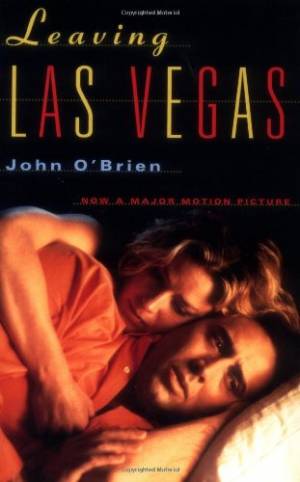 Love stories aren’t my area of expertise. I write books about gods, demons, and fascist governments. Nicholas Sparks, I ain’t. However, even surly speculative fiction writers can be touched by a well-written, thoughtful examination of human connectedness. That’s why Leaving Las Vegas is my favorite love story ever. I happen to be talking about John O’Brien’s novel, by the way, although the film adaptation from 1995 is a pitch-perfect retelling of the story and has great merit in its own right.
Love stories aren’t my area of expertise. I write books about gods, demons, and fascist governments. Nicholas Sparks, I ain’t. However, even surly speculative fiction writers can be touched by a well-written, thoughtful examination of human connectedness. That’s why Leaving Las Vegas is my favorite love story ever. I happen to be talking about John O’Brien’s novel, by the way, although the film adaptation from 1995 is a pitch-perfect retelling of the story and has great merit in its own right.
Within a few pages of Leaving Las Vegas I was transported to the seedy underbelly of Las Vegas. It was 2am and I was standing on the strip, watching the flashing lights reflected in puddles of beer and the glazed eyes of junkies. Like the city itself, the book is loud, abrasive, shameless, and ultimately heartbreaking. But, unlike the city, Leaving Las Vegas cuts through the neon, the chips, and the soiled bed sheets and asks, “Now what?”
The book’s reflections come from the examination of two self-destructive lost souls. One is Ben, a successful-guy-turned-drunk, now in the final stages of alcoholism; the other is Sera, a weary prostitute on the downside of her prime. They arrive in the city at different times and with different agendas, but a chance encounter brings them together.
Leaving Las Vegas is the most moving, powerful love story I have ever read—for a few reasons. For one thing, there isn’t a shred of falseness, cliche, or candy coating in the book. These are two people who have destroyed their lives beyond repair but who briefly find deep existential meaning in a relationship with each other. It doesn’t fix them. It doesn’t make them industrious, tax-paying citizens. They share a period of peace and togetherness in their otherwise lonely, rudderless lives.
Secondly, the love between Ben and Sera takes root in the most toxic of soils. Two broken people with nothing to offer grasp something pure and divine for a moment. Their love is a flower growing in the trash of a Las Vegas gutter. It’s beautiful because it wasn’t potted or cared for. It flowered in spite of the poison all around it.
If you read the book, be prepared to be offended, disgusted, and depressed. But also be prepared to be moved by the most unlikely of characters, touched by the details of their shared moments, and knocked flat by the transcendence of unconditional love.
Lindsey Gates-Markel, podcast host, actor, raconteur
 I’ll never get over Claire and Frank Underwood (of the Netflix series House of Cards). They’re powerful, they’re manipulative, they’re beautiful, they’re cool as refrigerated cucumbers. They talk. They take long night runs together and then sneak a cigarette together by an open window. Sure, occasionally they may need to murder good people who get in their way, but hey…. Remember that time with Meechum, and the bourbon? Holy moly. I’d forgive the Underwoods any sin. I already have.
I’ll never get over Claire and Frank Underwood (of the Netflix series House of Cards). They’re powerful, they’re manipulative, they’re beautiful, they’re cool as refrigerated cucumbers. They talk. They take long night runs together and then sneak a cigarette together by an open window. Sure, occasionally they may need to murder good people who get in their way, but hey…. Remember that time with Meechum, and the bourbon? Holy moly. I’d forgive the Underwoods any sin. I already have.
Kasia Hopkins, Adult Services Librarian at the Urbana Free Library
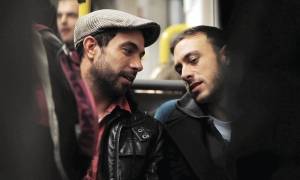 One recent film that I found to be a very sweet and realistic love story is Andrew Haigh’s 2011 movie Weekend. It’s a pet peeve of mine that so many films that are meant to be romantic completely skip over the part where characters actually get to know each other and fall in love by relying on tired ideas like “love at first sight” or fate. Weekend avoids this trope and instead paints a touching picture of two vulnerable and complex characters tentatively reaching out for a connection. It follows two young men in London, Russell and Glen, who meet during what they both assume will be a one-night stand. During their short time together they hang out, drink, have sex, and do drugs. But they also have the type of deep conversations about their lives and pasts and hopes for the future that draw them closer together. It’s a very frank and moving look at the beginnings of romance.
One recent film that I found to be a very sweet and realistic love story is Andrew Haigh’s 2011 movie Weekend. It’s a pet peeve of mine that so many films that are meant to be romantic completely skip over the part where characters actually get to know each other and fall in love by relying on tired ideas like “love at first sight” or fate. Weekend avoids this trope and instead paints a touching picture of two vulnerable and complex characters tentatively reaching out for a connection. It follows two young men in London, Russell and Glen, who meet during what they both assume will be a one-night stand. During their short time together they hang out, drink, have sex, and do drugs. But they also have the type of deep conversations about their lives and pasts and hopes for the future that draw them closer together. It’s a very frank and moving look at the beginnings of romance.
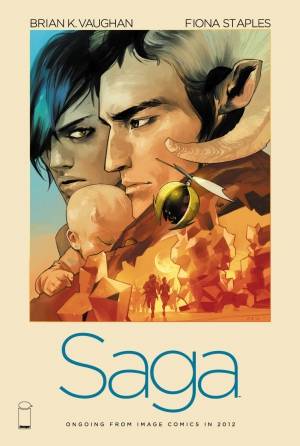 Another thing I find frustrating about love stories is how rarely they tell the story of what happens after the two characters fall in love, which seems to imply that the important part of the relationship is just the beginning. Some of my favorite love stories challenge this idea by showing committed relationships that weather challenges but remain powerful and romantic over time. One unique example of this is Saga, a science-fiction/fantasy comic book series by Brian K. Vaughan and Fiona Staples. Saga opens with a rather stunning scene of childbirth, and then finds [protagonists] Alana and Marko on the run with their newborn baby, Hazel. They are from different extraterrestrial races whose planets are embroiled in a violent and long-running war. They fell in love while Alana worked as a guard and Marko was a prisoner of war, and, now that they have escaped to be together, both sides of the conflict are out to capture them. While Saga is set in an imagined universe and many of the challenges the couple face are fantastical (intergalactic bounty hunters, a ghost babysitter, and alien beasts), it’s a very human story of a couple in love trying to protect each other and their family in a dangerous world.
Another thing I find frustrating about love stories is how rarely they tell the story of what happens after the two characters fall in love, which seems to imply that the important part of the relationship is just the beginning. Some of my favorite love stories challenge this idea by showing committed relationships that weather challenges but remain powerful and romantic over time. One unique example of this is Saga, a science-fiction/fantasy comic book series by Brian K. Vaughan and Fiona Staples. Saga opens with a rather stunning scene of childbirth, and then finds [protagonists] Alana and Marko on the run with their newborn baby, Hazel. They are from different extraterrestrial races whose planets are embroiled in a violent and long-running war. They fell in love while Alana worked as a guard and Marko was a prisoner of war, and, now that they have escaped to be together, both sides of the conflict are out to capture them. While Saga is set in an imagined universe and many of the challenges the couple face are fantastical (intergalactic bounty hunters, a ghost babysitter, and alien beasts), it’s a very human story of a couple in love trying to protect each other and their family in a dangerous world.
Mathew Green, SP Arts Editor
There are so many things I might mention here. There are so many great couples—in real life and in literature, on stage and on screen—that I could fawn over. I’ve never been a “love story” person where books are concerned, but I can admit that, even in the thrillers that I gravitate towards, I find myself fascinated by the interactions of a couple of crime-solving pairs. First, while I freely admit that the film version of Jeffery Deaver’s The Bone Collector could have been better, I thought the pairing of Denzel Washington and Angelina Jolie was pretty dead-on, and I wished that pair could have returned for more adventures. In Deaver’s novels, forensic scientist Lincoln Rhyme and street detective Amelia Sachs are a pair that give as good as they get, each of them stubborn, protective, and endlessly driven. Like all of the best—or at least most interesting—relationships, their love is physical and cerebral, complicated and fierce.
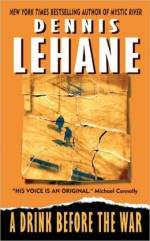 Likewise, the very genuine and compelling relationship of Patrick Kenzie and Angie Gennaro—in Dennis Lehane’s top-notch series of mysteries that includes Gone Baby Gone—is something that has grown and developed over time in a very organic and often messy way. If you’ve seen the aforementioned film and found it interesting, you should really go back to the first book in the series, A Drink Before the War, and find out who these people were and how their partnership (in every sense) came to be.
Likewise, the very genuine and compelling relationship of Patrick Kenzie and Angie Gennaro—in Dennis Lehane’s top-notch series of mysteries that includes Gone Baby Gone—is something that has grown and developed over time in a very organic and often messy way. If you’ve seen the aforementioned film and found it interesting, you should really go back to the first book in the series, A Drink Before the War, and find out who these people were and how their partnership (in every sense) came to be.
Sticking with literature, sort of, I have to say something here about theatre. We’re all familiar with the tragedies and comedies of Shakespeare, whether we’ve all read them or not. And there are so many more romantic pairings (or near-pairings) to be found in plays and musicals. In fact, if you think about it, most stage plays revolve around a relationship, or at least an attempt at one. Back when I used to act a little, I had the good fortune to play some of these characters. I did my Romeo once (all blond and miscast), and I was one of the runaway lovers in A Midsummer Night’s Dream in my youth. But, famous as those plays—and those couples—are the world over, those aren’t the ones that stick with me.
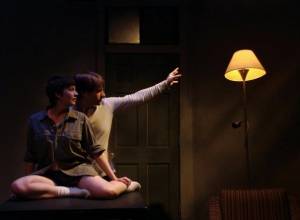 Of all of them, I think of Molly and Beane.
Of all of them, I think of Molly and Beane.
Once, several years ago, I was in really rarified company, blessed to be in a cast that included Gary Ambler, Joi Hoffsommer, and Katie Baldwin (now Prosise), all of us under the direction of Kay Bohannon Holley in a play you’ve never heard of called Love Song. It is a sweet and quietly profound play by John Kolvenbach about two very different but connected couples. In that production, I played Beane, a lonely and somewhat troubled individual who begins a tentative relationship with Molly, a young woman who has appeared suddenly in his apartment, wearing his clothes and taking his things. We are not sure, until the end of the play, if she is real or imagined, but it doesn’t matter in the end. The love that Beane has for Molly transforms him. He is awakened, emboldened, suddenly aware of the world and alive in it. And when their relationship ends, the devastation of that moment makes it clear that it doesn’t matter whether or not anyone else could see or hear her. It doesn’t matter if she was real. The love was. It really is a wonderful play, and I recommend it, on stage or on the page. And no, it wasn’t wonderful because I was in it. (I’m not one of those people that thinks everything I do is great or that everyone else should love it just because I enjoyed the experience.) Having said that, Ms. Hoffsommer and Mr. Ambler were amazing and tender and delightful, as they always are. And as Molly and Beane, I think Ms. Prosise and I did some of our best work up to that point. (Molly might have been fiction, but Katie’s the real thing. You should go see her in something.) I heard crying in the theater every night. And occasionally it came from the audience rather than from me.
While I am quite proud of my bona fides as a voracious reader and theatre nerd, I must admit that I tend to find my favorite couplings on film and television screens. I have, for most of my life, been the sort of person who watches films repeatedly, picking apart story and character to an admittedly annoying degree. And, now that whole seasons of television are so readily available, I have embraced binge-watching the way squirrels embrace tree branches. (I scramble from one to the next, in other words; but when I have one between my paws, I hold on tight.)
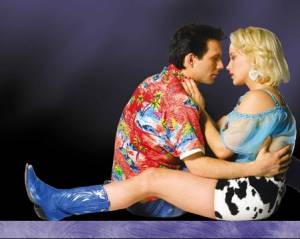 Film first. In this instance, I would like to acknowledge the wild, cool, dangerous love of Clarence and Alabama, the couple at the center of the late Tony Scott’s film True Romance. Scripted by a young and dervish-like Quentin Tarantino and starring Christian Slater, Patricia Arquette, Gary Oldman, Dennis Hopper, and a pretty terrifying James Gandolfini, this is a frenetic roller coaster ride of a love story. In it, Clarence and ‘Bama (played by Slater and Arquette, respectively) meet, fall immediately in love, and then set out on a desperate mission to untangle themselves from a vicious pimp, a vindictive mobster, some Hollywood producers, overzealous cops, and a big suitcase full of cocaine. This film boasts an extraordinary cast full of big personalities, but the outsize performances on display don’t hold a candle to the combustion between Slater and Arquette.
Film first. In this instance, I would like to acknowledge the wild, cool, dangerous love of Clarence and Alabama, the couple at the center of the late Tony Scott’s film True Romance. Scripted by a young and dervish-like Quentin Tarantino and starring Christian Slater, Patricia Arquette, Gary Oldman, Dennis Hopper, and a pretty terrifying James Gandolfini, this is a frenetic roller coaster ride of a love story. In it, Clarence and ‘Bama (played by Slater and Arquette, respectively) meet, fall immediately in love, and then set out on a desperate mission to untangle themselves from a vicious pimp, a vindictive mobster, some Hollywood producers, overzealous cops, and a big suitcase full of cocaine. This film boasts an extraordinary cast full of big personalities, but the outsize performances on display don’t hold a candle to the combustion between Slater and Arquette.
These are not necessarily heroes we’re talking about. They might actually be sociopaths, the more I think about it. (Funny story: I recommended this movie to some friends while I was in college. They were double-dating and looking for a good “date movie.” They were very upset with me after seeing this, and we don’t speak anymore, but I stand by my recommendation.) Clarence and Alabama lie, cheat, steal, and even kill. But there is something compelling and almost enviable about the force of their attraction and their devotion to each other. There is something about the lengths they will go to for each other that is, for lack of a better word, romantic.
There might be something wrong with me. I’m looking into that.
Finally, I want to talk about love stories that aren’t exactly love stories. Well, they are, but… Let me be clear: I’m talking about love. I’m talking about mutual respect, fierce loyalty, and brutal honesty. I’m talking about people who would lay down their lives for each other and not think twice about calling each other on their shit.
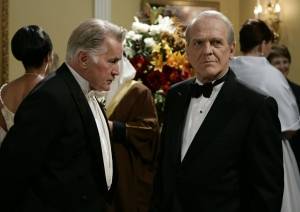 I’m talking, in short, about friendship. And of all the friendships I’ve seen depicted on television, the prize has to go to the relationship between President Josiah “Jed” Bartlet and Chief-of-Staff Leo McGarry on Aaron Sorkin’s The West Wing. Over the first four seasons of this landmark series, the bond between these political warhorses is so deep and true that it often brought tears to my eyes. (There were tears of another kind in the post-Sorkin seasons, when characters were prone to do things that made little sense, but that’s another story.) Bartlet’s Season One admission to Leo that he has Multiple Sclerosis is touching; his shame that he has hidden this illness from his oldest friend speaks volumes, as does Leo’s assertion that, even if he had known, he still would have found a way to get Batlet elected. In the Season Two opener, after Bartlet has been shot, he lies on a hospital gurney about to undergo emergency surgery. Before he is put under anesthesia, he gestures for Leo to come closer. And then, rather than telling him some secret information or asking him for anything, the President simply kisses his friend on the cheek. Leo says nothing and understands everything in that moment.
I’m talking, in short, about friendship. And of all the friendships I’ve seen depicted on television, the prize has to go to the relationship between President Josiah “Jed” Bartlet and Chief-of-Staff Leo McGarry on Aaron Sorkin’s The West Wing. Over the first four seasons of this landmark series, the bond between these political warhorses is so deep and true that it often brought tears to my eyes. (There were tears of another kind in the post-Sorkin seasons, when characters were prone to do things that made little sense, but that’s another story.) Bartlet’s Season One admission to Leo that he has Multiple Sclerosis is touching; his shame that he has hidden this illness from his oldest friend speaks volumes, as does Leo’s assertion that, even if he had known, he still would have found a way to get Batlet elected. In the Season Two opener, after Bartlet has been shot, he lies on a hospital gurney about to undergo emergency surgery. Before he is put under anesthesia, he gestures for Leo to come closer. And then, rather than telling him some secret information or asking him for anything, the President simply kisses his friend on the cheek. Leo says nothing and understands everything in that moment.
Of all of these small touches, the one that has always moved me the most is a moment in Season Four. On the afternoon of the Presidential debate that will likely decide the election (and whether or not Bartlet will get a second term), Leo takes Bartlet aside and says the following:
“There’s no such thing as ‘too smart.’ There’s nothing you can do that’s not gonna make me proud of you.”
I re-watched this episode on the day I wrote this entry, as a matter of fact; it was probably the 43rd time I had seen it, and I teared up just like always. It gets me every time. And why?
Because love is a beautiful thing. Real love. Heartfelt love. Between friends, between spouses, between lovers, between men, women, or any combination thereof.
Love is love.
Photo credit: Love Song, by Jesse Folks.








